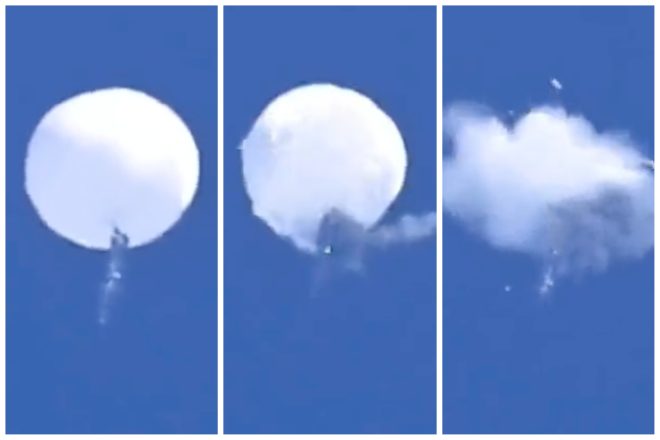Recovery of the balloon is in progress.
A trio of Navy warships, service divers and the FBI are on the hunt for the wreckage of a high-altitude Chinese spy balloon that was shot down on Saturday by an Air Force F-22 Raptor off the coast of South Carolina, Defense Department officials told reporters Saturday. “The balloon, which was...

news.usni.org
A trio of Navy warships, service divers and the FBI are on the hunt for the wreckage of a high-altitude Chinese spy balloon that was shot down on Saturday by an Air Force F-22 Raptor off the coast of South Carolina, Defense Department officials told reporters Saturday.
“The balloon, which was being used by the PRC in an attempt to surveil strategic sites in the continental United States, was brought down above U.S. territorial waters,” Secretary of Defense Lloyd Austin said in a Saturday statement. “On Wednesday, President [Joe] Biden gave his authorization to take down the surveillance balloon as soon as the mission could be accomplished without undue risk to American lives under the balloon’s path.”
The Raptor from the 149 Fighter Squadron, based at Langley Air Force Base, used a single AIM-9X Sidewinder, fired from 58,000 feet in the air, to shoot down the balloon that was operating at 62,000 feet, a senior military official told reporters on Saturday afternoon.
The remains of the surveillance balloon, about the size of three school buses, is spread over a seven-mile debris field in shallow water in the Atlantic, a senior military official told reporters.
Guided-missile destroyer USS
Oscar Austin (DDG-79), guided-missile cruiser USS
Philippine Sea (CG-58) and amphibious warship USS
Carter Hall (LSD-50) are on station near the crash site. Coast Guard cutters and boats are also on the scene to assist in the recovery, a message left with a Coast Guard Atlantic Area spokesman was not immediately returned.
Navy divers are currently embarked aboard the warships off the coast, a Navy official confirmed to USNI News. FBI counter-intelligence agents are also part of the investigation, Pentagon officials said Saturday.
“We have… capable Navy divers to go down if needed. We’ll also have unmanned vessels that can go down to get the structure and lift it back up on the recovery ship,” the senior military official said.
“We’ll have the FBI on board as well, under the counterintelligence authorities for categorizing and assessing the platform itself.”
According to the same senior military official, a Navy salvage ship will be on station within the next two days.
The high-altitude surveillance craft had been operating over U.S. and Canadian airspace for at least the last week. It traveled over sensitive military sites, including the intercontinental missile silos at Malmstrom Air Force Base, Montana.
According to reporters following the path of the balloon, it entered the U.S. air defense identification zone Near Alaska on Jan. 28, crossed into Canada on Jan. 30 and crossed into the skies over Idaho on Jan. 31.
U.S. officials said they elected not to shoot down the balloon over the continental United States for two reasons – to prevent risk to people and property that would be in a potential debris field and to continue to gather intelligence from the craft while it continued to operate over the U.S.
“We assessed that it did not pose a threat at any time to civilian air traffic because of the altitude of the balloon. We also said that it did not pose a military or kinetic threat to U.S. people or property on the ground, although we were constantly updating both of those assessments and prepared to take it out if that threat profile changed,” the senior military official told reporters on Saturday.
Unlike low-earth orbit satellites, the near-space altitude in which the balloon operated was sovereign U.S.-controlled air space, USNI News understands. Chinese officials have said that the balloon had gone off course and had no hostile intent. A second Chinese balloon has been spotted over Latin America.
The balloon was low enough in the sky, that several people on shore captured images of the F-22 firing the anti-air missile to pop the balloon just off the coast of Myrtle Beach, S.C.
The fighters left the Virginia air base Saturday afternoon with the call signs Frank-1 and Frank-2, according to plane spotters on social media. The callsigns are believed to be a reference to World War I ACE Army Air Corps 1st Lt. Frank Luke. His nickname
was the Arizona Balloon Buster, wrote reporter Marcus Weisgerber
on Twitter.
! Once again they save the planet!


